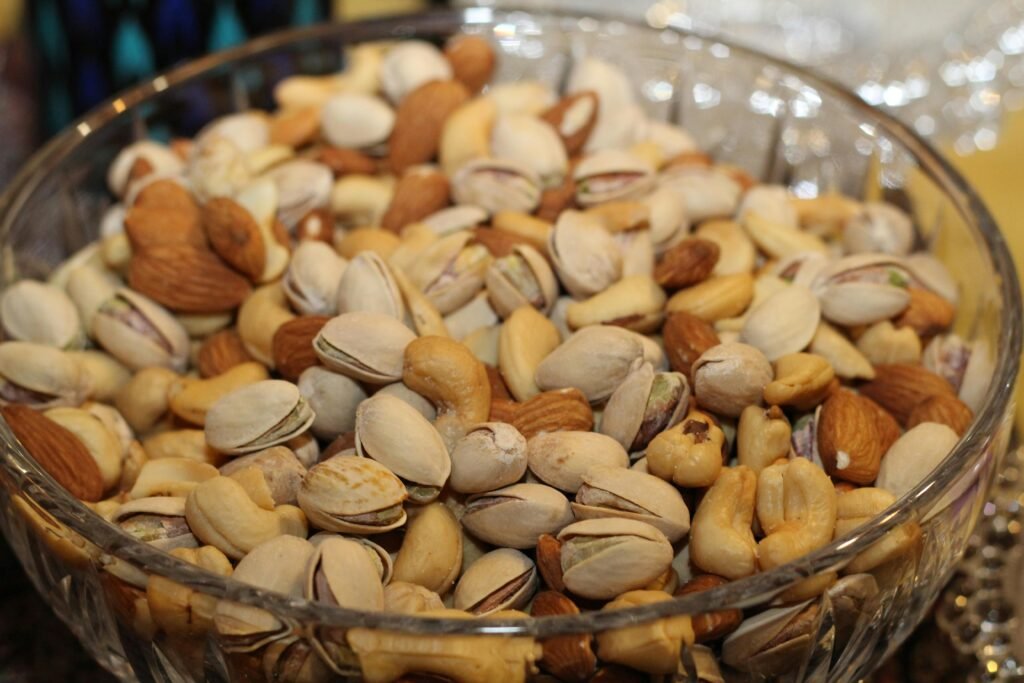Nutrition for Diabetics: Essential Guide to Manage Blood Sugar
To properly manage diabetes, you must have a thorough grasp of nutrition and how different meals affect blood sugar levels. Individuals with diabetes must strictly regulate their carbohydrate consumption since carbs have a major effect on blood sugar levels. Focusing on complex carbs with a lower glycemic index, such as whole grains, vegetables, and legumes, will help you maintain stable blood glucose levels. Simple carbs, such as sweet meals and refined grains, should be avoided since they can induce fast blood sugar rises.
Meal planning is an essential component of diabetes control. Structured meal programs that stress portion management and balanced meals can help to maintain stable blood sugar levels. It is critical to consume a diverse range of nutrient-dense foods, such as lean proteins, healthy fats, and fiber-rich vegetables. Regular meals and snacks provide regular energy levels and glycemic management. The plate technique, which divides the plate into portions for vegetables, protein, and carbs, can make meal preparation easier while still ensuring nutritional balance.
Diabetes management relies heavily on key nutrients. Fiber, for example, reduces the absorption of sugar and helps to regulate blood sugar levels. Fiber-rich foods include fruits and vegetables, whole grains, and legumes. Omega-3 fatty acids, found in fatty fish, flaxseeds, and walnuts, promote heart health, which is especially significant for diabetics, who are more likely to develop cardiovascular disease. Magnesium, present in leafy greens, nuts, and seeds, improves insulin sensitivity and glucose metabolism. Ensuring appropriate consumption of these nutrients can benefit both general health and diabetes control.
Lifestyle adjustments are also crucial in controlling diabetes. Regular physical exercise improves insulin sensitivity and blood glucose regulation. Walking, cycling, and strength training are all useful. A balanced diet and regular exercise can help you maintain a healthy weight and avoid problems from diabetes. Furthermore, stress-management practices such as mindfulness, meditation, and proper sleep help to improve glucose control. Combining a comprehensive dietary strategy with these lifestyle modifications results in a strong framework for effectively controlling diabetes.
Importance of Nutrition in Diabetes
Nutrition is important in diabetes management because the foods you eat have a direct impact on your blood sugar levels. Understanding how different foods interact with the body might make the difference between maintaining stable glucose levels and experiencing harmful increases. carbs, proteins, and fats all have different effects on blood sugar, with carbs having the most immediate influence. Prioritizing complex carbs like whole grains, vegetables, and legumes over simple carbohydrates like sugary snacks and refined grains promotes more stable glucose levels, which is essential for good diabetes treatment.
To minimize blood sugar changes, diabetics must plan their meals carefully. Creating balanced meals that stress portion management and incorporate a range of nutrient-dense foods is critical. Lean proteins, healthy fats, and fiber-rich veggies should be the foundation of every meal. Using approaches such as the plate method, which assigns defined quantities for vegetables, meats, and carbs, can help to ease meal planning while still ensuring nutritional balance. Regular, well-timed meals and snacks can help to prevent drastic swings in blood sugar levels, resulting in more regular glucose control.
Key nutrients have important roles in diabetes control. Fiber is especially important because it inhibits sugar absorption, which helps to maintain blood sugar levels. A diabetic’s diet should include fiber-rich foods such as fruits, vegetables, whole grains, and legumes. Omega-3 fatty acids, found in fatty fish, flaxseeds, and walnuts, promote heart health, which is critical because diabetics are at a higher risk of cardiovascular disease. Additionally, magnesium, found in leafy greens, nuts, and seeds, improves insulin sensitivity and glucose metabolism. Ensuring an appropriate intake of these nutrients can considerably enhance general health and diabetes management.
Incorporating lifestyle adjustments is also crucial for good diabetes management. Regular physical exercise, such as walking, cycling, and weight training, increases insulin sensitivity and helps with blood glucose management. Maintaining a healthy weight via balanced meals and regular exercise can help lower the risk of diabetic complications. Stress management practices such as mindfulness, meditation, and proper sleep all help to improve glucose homeostasis. Diabetics can improve their quality of life and manage their disease by combining a thorough dietary approach with lifestyle changes.
Understanding Diabetes
Diabetes is a chronic disorder defined by high blood sugar levels caused by the body’s inability to generate enough insulin or efficiently use the insulin it does make. This reduction in insulin activity causes increased blood glucose levels, which can lead to a variety of health issues if not treated effectively. The three main kinds of diabetes—Type 1, Type 2, and gestational diabetes—present distinct problems that necessitate individualized care techniques. Nutrition, on the other hand, is a common and critical component in managing all forms of diabetes, since it plays an important role in lowering blood sugar levels and supporting general health.
Type 1 diabetes is an autoimmune disease in which the body’s immune system targets and kills insulin-producing beta cells in the pancreas. This kind of diabetes usually appears during childhood or adolescence, and people who have it require insulin therapy for the rest of their lives. To maintain stable blood glucose levels, people with Type 1 diabetes should balance their carbohydrate consumption with insulin treatment. Counting carbs and knowing their influence on blood sugar is critical for proper meal planning and insulin administration, allowing you to avoid both hyperglycemia and hypoglycemia.
kind 2 diabetes is the most prevalent kind of diabetes, which is frequently linked to weight and lifestyle choices. It happens when the body develops insulin resistance or the pancreas fails to generate enough insulin to fulfill the body’s demands. Type 2 diabetes nutrition therapy focuses on weight loss, balanced meals, and portion control in order to enhance insulin sensitivity and reduce blood sugar. Whole grains, lean meats, healthy fats, and an abundance of fruits and vegetables can all assist with weight management and blood sugar control. Regular physical exercise and lifestyle adjustments, such as limiting processed foods and sugary beverages, are also essential for treating Type 2 diabetes.
Gestational diabetes develops throughout pregnancy and can endanger both the mother and the baby if not handled appropriately. Insulin resistance occurs as a result of hormonal changes during pregnancy. Nutrition is essential for controlling gestational diabetes, with an emphasis on balanced meals that stabilize blood sugar levels and promote good fetal growth. Pregnant women with gestational diabetes should eat complex carbs, fiber, lean proteins, and healthy fats, but avoid simple sugars and processed carbohydrates. Blood sugar levels should be monitored on a regular basis, and appropriate weight growth should be maintained during pregnancy.
Nutrition is a critical component of successful diabetes care in all cases. Proper food choices assist to maintain blood sugar levels, avoid problems, and enhance general health and well-being. Understanding the significance of nutrition is critical for everyone living with diabetes, whether it is through precise carbohydrate counting in Type 1 diabetes, weight control in Type 2, or balanced meal planning in gestational diabetes.
Different Types of Diabetes
- Type 1 Diabetes: An autoimmune disorder in which the pancreas produces little or no insulin. Patients must match their insulin consumption with their diet.
- Type 2 Diabetes: The most common form, often associated with obesity and lifestyle factors. It involves insulin resistance and requires careful dietary planning.
- Gestational Diabetes: Occurs during pregnancy and can increase the risk of developing Type 2 diabetes later in life.

Key Nutrients for Diabetics
Understanding the role of various nutrients helps diabetics make informed dietary choices.
Carbohydrates and Blood Sugar
Carbohydrates have the most significant impact on blood sugar levels. Diabetics should focus on complex carbohydrates found in whole grains, vegetables, and legumes, which are absorbed more slowly and prevent spikes in blood sugar.
Fiber’s Role in Diabetes Management
Fiber is crucial for diabetics as it slows the absorption of sugar and helps maintain stable blood sugar levels. High-fiber foods include vegetables, fruits, whole grains, and legumes.
Protein Intake for Diabetics
Proteins have minimal impact on blood sugar and are essential for muscle repair and growth. Diabetics should choose lean protein sources such as poultry, fish, beans, and low-fat dairy products.
Healthy Fats and Diabetes
Incorporating healthy fats from sources like avocados, nuts, seeds, and olive oil can improve insulin sensitivity and provide long-lasting energy. Avoid trans fats and limit saturated fats to reduce cardiovascular risks.
Vitamins and Minerals
Certain vitamins and minerals play a significant role in diabetes management. For instance, magnesium helps regulate blood sugar levels, while vitamin D is crucial for insulin sensitivity. Diabetics should aim for a balanced intake of essential nutrients through a varied diet.
Creating a Diabetic-Friendly Diet
Planning a balanced diet involves careful consideration of the types and quantities of food consumed.
Planning Balanced Meals
A balanced meal for diabetics includes a mix of carbohydrates, proteins, and fats. The plate method is an effective way to ensure proper portions, with half the plate filled with non-starchy vegetables, a quarter with lean protein, and a quarter with whole grains or starchy vegetables.
Portion Control
Controlling portion sizes is vital for managing blood sugar levels. Using smaller plates, measuring food portions, and being mindful of serving sizes can help diabetics avoid overeating.
Timing of Meals
Regular meal times help prevent blood sugar spikes and dips. Diabetics should aim to eat at consistent intervals and include healthy snacks if needed to maintain stable glucose levels.
Reading Food Labels
Understanding food labels can help diabetics make healthier choices. Key elements to look for include serving size, total carbohydrates, fiber content, and added sugars.
Foods to Include
Non-Starchy Vegetables
Non-starchy vegetables like broccoli, spinach, and peppers are low in carbohydrates and high in fiber, making them ideal for diabetics.
Whole Grains
Whole grains such as brown rice, quinoa, and oatmeal provide complex carbohydrates and fiber, which help regulate blood sugar levels.
Lean Proteins
Lean protein sources like chicken, turkey, tofu, and legumes are essential for muscle maintenance and have a minimal impact on blood sugar.
Healthy Fats
Healthy fats from sources like nuts, seeds, and olive oil can improve insulin sensitivity and provide long-lasting energy.
Low-Glycemic Fruits
Fruits with a low glycemic index, such as berries, apples, and pears, cause slower rises in blood sugar and are rich in vitamins and antioxidants.
Dairy Products
Low-fat or non-fat dairy products provide calcium and protein without excessive saturated fats, making them a good choice for diabetics.
Foods to Avoid
Sugary Foods
Sugary foods, including sweets, candies, and sugary beverages, can cause rapid spikes in blood sugar and should be avoided.
Refined Carbohydrates
Refined carbohydrates like white bread, pasta, and pastries have a high glycemic index and can lead to unstable blood sugar levels.
Trans Fats and Processed Foods
Trans fats and heavily processed foods often contain unhealthy fats and added sugars, increasing the risk of heart disease and making blood sugar management more difficult.
Meal Planning Tips
Using the Plate Method
The plate method is a simple way to ensure balanced meals. Fill half your plate with non-starchy vegetables, a quarter with lean protein, and a quarter with whole grains or starchy vegetables.
Snack Ideas for Diabetics
Healthy snack options include a handful of nuts, Greek yogurt, carrot sticks with hummus, or an apple with almond butter.

Diabetes and Lifestyle
Beyond nutrition, lifestyle factors significantly influence diabetes management.
Physical Activity
Regular physical activity helps improve insulin sensitivity and maintain a healthy weight. Diabetics should aim for at least 30 minutes of moderate exercise most days of the week.
Monitoring Blood Sugar
Regular blood sugar monitoring helps diabetics understand how different foods and activities affect their glucose levels, allowing for better management.
Managing Stress
Stress can impact blood sugar levels, making stress management techniques such as mindfulness, meditation, and regular exercise essential for diabetics.
Special Considerations
Nutrition for Type 1 Diabetes
Type 1 diabetics must balance carbohydrate intake with insulin doses. Consistent monitoring and meal planning are crucial.
Nutrition for Type 2 Diabetes
Individuals with type 2 diabetes benefit from a diet low in refined carbohydrates and sugars, emphasizing whole foods, regular physical activity, and mindful portion control for optimal health management.
Nutrition for Gestational Diabetes
Pregnant individuals diagnosed with gestational diabetes should prioritize consuming well-rounded meals, focusing on a balance of nutrients, and adhere to a routine monitoring schedule in order to safeguard both their own health as well as that of the developing fetus during this crucial period of pregnancy. It is imperative for these individuals to diligently follow these guidelines to ensure optimal outcomes for themselves and their baby.
Common Myths about Diabetes Nutrition
- Myth: Diabetics must avoid all carbohydrates. Fact: Diabetics can eat carbohydrates, but they should focus on complex carbs and monitor portions.
- Myth: Sugar-free products are always good for diabetics. Fact: Some sugar-free products contain unhealthy substitutes and can still impact blood sugar.
- Myth: Diabetics can’t eat fruits. Fact: Diabetics can enjoy fruits, especially low-glycemic ones, in moderation.
Conclusion
Managing diabetes with diet necessitates a thorough grasp of how various meals affect blood sugar levels. carbs, proteins, and fats all affect blood sugar in different ways, with carbs having the most rapid effect. For optimal diabetes treatment, it is critical to eat well-balanced meals that include a range of nutritious foods. Prioritizing complex carbs such as whole grains, veggies, and legumes over simple carbohydrates like sugary snacks and refined grains helps to keep glucose levels stable. Furthermore, including lean proteins and healthy fats into meals can reduce sugar absorption, which helps with blood sugar regulation. Portion sizes are also important; eating the right quantity will help minimize blood sugar spikes and troughs, adding to overall stability.
Diabetics must regularly monitor their blood sugar levels in order to understand how different diets influence their bodies and make required modifications. In addition, incorporating good lifestyle habits such as frequent physical activity, appropriate sleep, and stress management is essential. Exercise increases insulin sensitivity and aids in blood sugar regulation, but appropriate rest and stress reduction can reduce hormonal oscillations that impact glucose levels. Making educated dietary choices and adopting these healthy behaviors allows people with diabetes to gain more control of their illness, lowering the risk of complications and improving their quality of life. Diabetics who adopt a well-rounded nutritional strategy and lifestyle can better control their disease and enjoy healthier, more balanced lives.

